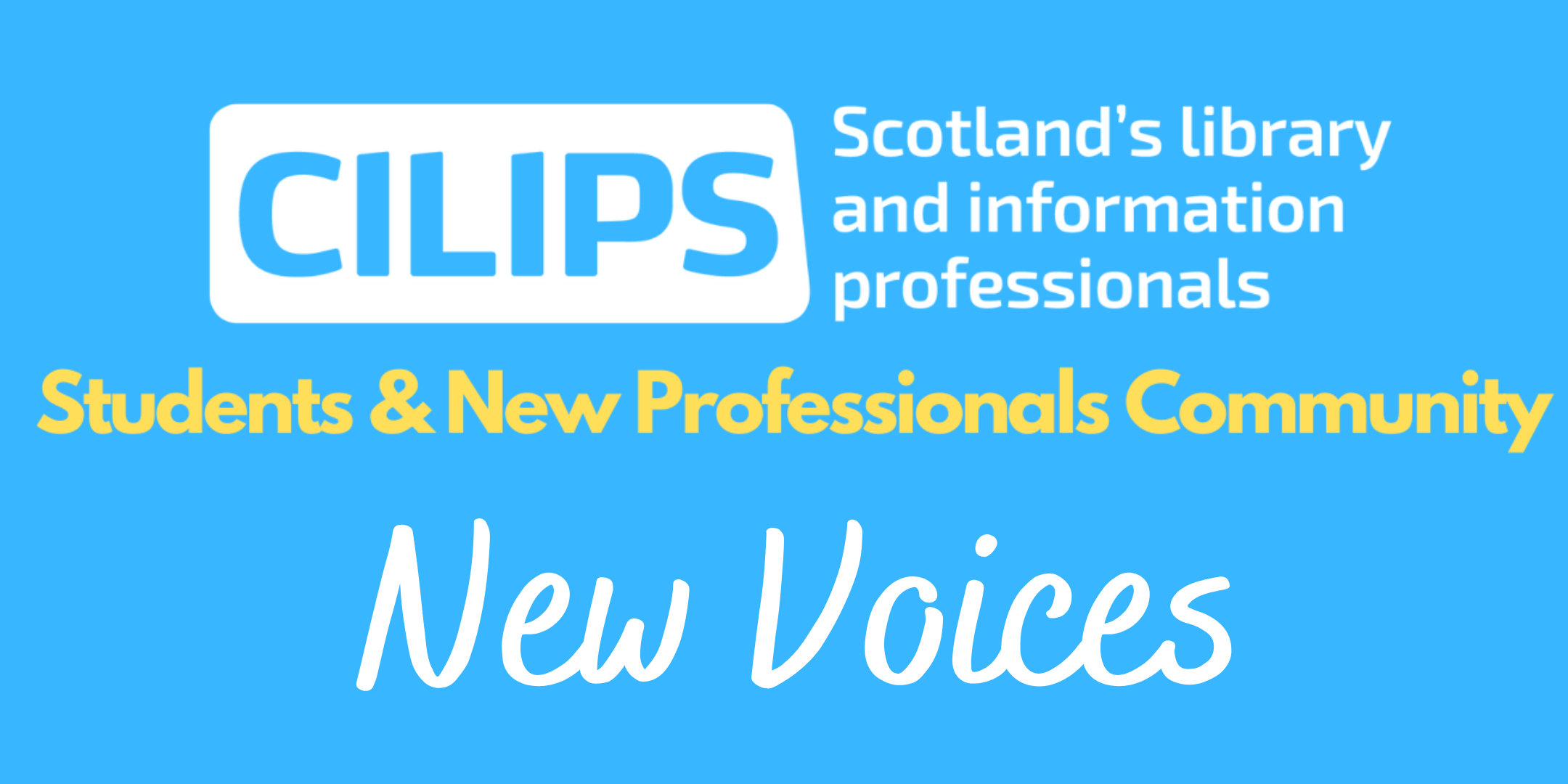New Voices RGU Student Series 2024 – Anna Jarvis
Category: Blog, New Voices, RGU Student Series 2024

In the 2024 Student Series for the New Voices blog, CILIPS Students & New Professionals Community will be sharing the views of Robert Gordon University students from the MSc in Information and Library Studies.
With special thanks to Dr Konstantina Martzoukou, Teaching Excellence Fellow and Associate Professor, for organising these thought-provoking contributions.

Anna did her Undergraduate degree in English Literature at the University of Edinburgh, and after 10 years of working in hospitality, she is studying the MSc in Information and Library studies in order to finally fulfil her dream of being a librarian. Anna is currently working full time in University Administration alongside her studies. In her spare time she reads (a lot!), draws, swims and walks and she has one very grumpy cat.
Embracing change: The changing role of information professionals in supporting information literacy skills for using generative artificial intelligence tools in a higher education context
Information literacy (IL) is ‘the ability to think critically and make balanced judgements about any information we find and use.‘ (CILIP 2018). In a world where the availability of generative artificial intelligence tools (or Gen AI) is growing, the ability to think critically has never been more important, particularly for the current generation of university students, who are working in a rapidly changing digital world that includes easy access to generative AI tools with a range of functions. As information professionals, it is vital that we equip these students with the skills they need to judge the most appropriate use of such tools, without compromising academic standards or quality of education.
Advances in technology are nothing new in the world of information literacy – it’s easy to forget the fear that existed around the initial rapid rise of the internet, and the access to unfiltered knowledge it enabled – knowledge that we cannot always identify the providence of. The role of the information professional in education has always been to respond to and integrate new technologies and tools, and these new advances are merely ‘the latest iteration of a cycle’ (Tait and Pierson 2022 p.2).
In the higher education environment, there is growing trepidation about the effect of generative AI on academic integrity – a study into the ongoing conversation around the use of ChatGPT determined that the focus in academic circles tends to be on ‘the opportunities it affords for academic dishonesty’ (Sullivan, Kelly and McLaughlan 2023 p.35), rather than the benefits AI could bring for enhancing learning. This is where the narrative needs to change. As information professionals, we need to see and embrace the opportunities generative AI can offer – such as making education more accessible to students with a variety of backgrounds, skills and learning needs. Gen AI may be just what we need to level the playing field.
AI can provide a way to tailor education to individual students with special educational requirements (OECD 2021) in a way that educators and information professionals simply would not have the time to do. By incorporating novel approaches to learning, education becomes more inclusive, and the standard of education goes up across the board. If AI can help students understand ideas more clearly, this leads to deeper knowledge, and allows them to produce better work. It can be utilised to reframe content in a way that makes it easier to digest, or to help a student produce a personalised study plan which works best for them. For many students, this may be the last opportunity they have to learn IL skills in an education environment, before they enter the real world – the skills they learn now will help them in a lifetime of learning, and are a valuable resource in the current labour market (QAA 2023)
Certainly, ignoring AI won’t make it go away – it’s the job of information professionals to make sure the tools and training resources are available to allow students to use AI safely, responsibly and in a way that enhances their own talents and uniqueness as human beings – qualities that AI cannot replace. We need to work in collaboration with educators and students within universities to be proactive rather than reactive in the development of IL skills to include generative AI. We should be at the forefront, keeping up to date with new advances and actively learning ourselves, in order to put us in the best position to advise, guide, and educate students, just as information professionals in higher education have always done.
References
CHARTERED INSTITUTE OF LIBRARIANS AND INFORMATION PROFESSIONALS (CILIP), 2018. CILIP Definition of Information Literacy. [online]. London: CILIP. Available from: cilip_definition_doc_final_f.pdf (ymaws.com) [accessed 25 November 2023].
ORGANISATION FOR ECONOMIC CO-OPERATION AND DEVELOPMENT (OECD), 2021. OECD Digital Education Outlook 2021: Pushing the Frontiers with Artificial Intelligence, Blockchain and Robots. [online]. Paris: OECD Publishing. Available from: https://www.oecd-ilibrary.org/sites/589b283f-en/index.html?itemId=/content/publication/589b283f-en [accessed 25 November 2023].
THE QUALITY ASSURANCE AGENCY FOR HIGHER EDUCATION (QAA), 2023. Generative Artificial Intelligence in Education – QAA’s response to DfE call for evidence. [online]. Gloucester: QAA. Available from: https://www.qaa.ac.uk/docs/qaa/news/generative-artificial-intelligence-call-for-evidence.pdf?sfvrsn=db01af81_8 [Accessed 25 November 2023]
SULLIVAN, M. and KELLY, A. and MCLAUGHLAN, P., 2023. Chat GPT in higher education: Considerations for academic integrity and student learning, Journal of Applied Learning & Teaching, 6(1), 31-40.
TAIT, E. and PIERSON, C., 2022. Artificial Intelligence and Robots in Libraries: Opportunities in LIS Curriculum for Preparing the Librarians of Tomorrow, Journal of the Australian Library and Information Association, 71(3), 256-274.

